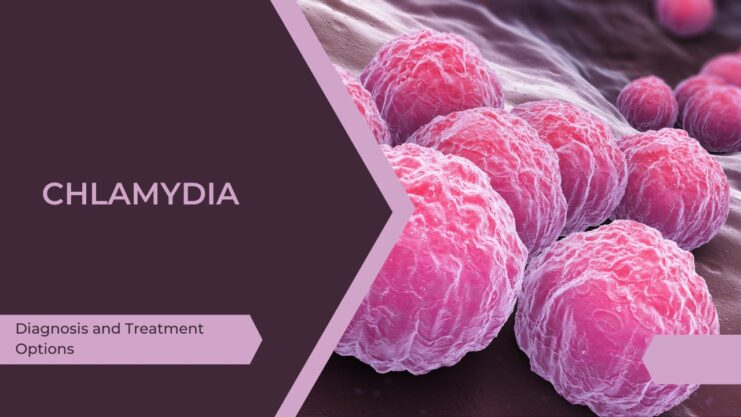Chlamydia trachomatis, a common sexually transmitted disease (STD) that affects both men and women, is often referred to as the “silent” infection. Its prevalence is alarming, with millions of new cases reported every year, making it the most frequently reported bacterial STD worldwide. Chlamydia is transmitted primarily through sexual contact, including vaginal, anal, and oral sex. This stealthy disease can also pose risks to pregnant women, potentially leading to complications during childbirth and infections in newborns.
Risk factors:
Several factors can increase your chances of contracting Chlamydia. Having multiple sex partners or a new sexual partner elevates the risk, as does unprotected sex. Younger individuals, particularly those between the ages of 15 and 24, are more susceptible due to their likelihood of engaging in high-risk sexual behavior. A history of a previous STD or a current co-infection with another STD also raises the likelihood of contracting Chlamydia.
Symptoms:

Most individuals with Chlamydia have no symptoms, with up to 50% of infected males and 80% of infected females remaining asymptomatic. As a result, diagnosis is usually delayed. Even when Chlamydia causes no symptoms, it can still damage your reproductive system.
If you do have symptoms, they may appear several days to weeks after having sex with an infected partner.
In women:
- Abnormal vaginal discharge
- Abnormal vaginal bleeding (after sex or in between menses)
- Pain or burning sensation when urinating
- Pain during sex
- Lower abdominal pain
- Fever (can get this due to PID)
In men:
- Penile discharge (usually yellow thick discharge from the urethra)
- Pain or burning sensation when urinating
- Itch or discomfort around the penis
- Pain and swelling in one or both testicles (less common)
- Fever
In men or women who practice anal sex, symptoms can include:
- Rectal pain
- Rectal discharge
- Rectal bleeding
Treatment:

Chlamydia is a treatable infection, and with appropriate antibiotic therapy, the infection can be completely cleared from the body. The most common antibiotics prescribed for treating Chlamydia are azithromycin and doxycycline. Both medications are highly effective in curing the infection, but it is crucial to take the full course of antibiotics as prescribed by your healthcare provider to ensure complete eradication of the bacteria.
Azithromycin is typically administered as a single dose, while doxycycline is usually prescribed as a twice-daily dose for seven days. It is essential to follow your healthcare provider’s instructions and not to share your medication with others. In some cases, alternative antibiotics such as erythromycin or levofloxacin may be prescribed for those who are allergic to azithromycin or doxycycline, or for pregnant women.
During treatment, it is important to abstain from sexual activity until the infection has been completely cleared to prevent reinfection and further spread of the infection. This generally means waiting at least seven days after completing the antibiotic course or until symptoms have resolved, whichever is longer. Also, it is crucial to inform your sexual partners about your Chlamydia diagnosis so that they can also get tested and treated if necessary.
To ensure that the infection has been successfully treated, it is recommended to get retested for Chlamydia after completing the antibiotic course, usually about three months after treatment. This follow-up testing helps identify cases of reinfection, treatment failure, or possible antibiotic resistance.
Practicing safe sex, including using condoms consistently and correctly, and getting regularly tested if you are sexually active, are the best ways to prevent Chlamydia and its complications.
Complications:

In women, untreated Chlamydia can spread to your uterus and fallopian tubes causing pelvic inflammatory disease (PID). Often, PID is asymptomatic; however, some women may experience fever, abdominal or pelvic pain.
Even if PID does not cause any symptoms in the early stages, PID can cause permanent damage to your reproductive system which can lead to long-term pelvic pain, subfertility, and increases the risk of ectopic pregnancy (pregnancy outside the uterus).
In men, Chlamydia can cause epididymitis (infection in the tube that carries sperm from the testicles) causing pain and fever. Rarely, it causes infertility in men.
Also, untreated Chlamydia may increase your chances of getting other STDs, especially gonorrhea.
Patients with Chlamydia also have a higher frequency of getting Reiter syndrome (inflammation of the urethra, eyes (conjunctivitis) and joints).
Untreated chlamydia is also linked with an increased risk of cervical cancer and also HIV infection.
If you think you are at risk of contracting chlamydia, it would be advisable to get tested as it is an easy and quick test (in men – urine test, in women – vaginal swab test) and chlamydia is easily treated.
Prevention Strategies

Practicing safe sex is crucial in preventing the spread of Chlamydia trachomatis. Consistent and correct use of latex condoms during vaginal, anal, and oral sex can significantly reduce the risk of transmission. Additionally, limiting the number of sexual partners and engaging in mutually monogamous relationships with tested partners can further decrease the likelihood of contracting the infection.
Regular screening for Chlamydia is essential, particularly for sexually active individuals, as the infection often presents no symptoms. The Centers for Disease Control and Prevention (CDC) recommends annual Chlamydia screening for sexually active women under 25 years old and older women with risk factors such as new or multiple sexual partners. Men who have sex with men should also undergo regular testing.
Open and honest communication with sexual partners about one’s sexual health and history is vital. This includes discussing previous STDs, test results, and safe sex practices. Such conversations can build trust, create a supportive environment, and encourage regular testing and safer sex behaviors.
Psychological Impacts of Chlamydia
Being diagnosed with Chlamydia or any STD can result in emotional distress and feelings of stigma. Individuals may experience anxiety, guilt, or shame, and may fear rejection from partners or judgment from others. It is essential to recognize that Chlamydia is a common and treatable infection, and feelings of shame should not deter individuals from seeking necessary treatment and support.
The impact of Chlamydia on relationships can vary significantly depending on factors such as communication, trust, and understanding between partners. Some relationships may become strained due to fear, blame, or misunderstanding. It is crucial for both partners to engage in open dialogue about the infection, treatment, and prevention to foster a healthy and supportive relationship dynamic.
Coping mechanisms and support systems can greatly alleviate the psychological burden associated with Chlamydia. Joining support groups, seeking therapy or counseling, and confiding in trusted friends or family members can provide emotional support and help individuals navigate the challenges they may face.
Public Health Implications

Public health campaigns play a crucial role in raising awareness about Chlamydia and promoting safe sex practices. Educational initiatives targeting at-risk populations can help reduce transmission rates, encourage testing, and destigmatize the infection. By disseminating accurate information and resources, public health campaigns can contribute to a better understanding of Chlamydia and its consequences.
Ensuring accessible testing and treatment services is essential to combat the spread of Chlamydia. Free or low-cost clinics, mobile testing units, and outreach programs can help reach vulnerable populations and reduce barriers to care. By providing affordable and accessible services, public health organizations can facilitate early detection and treatment, ultimately reducing the risk of complications and transmission.
Strategies for reducing Chlamydia prevalence involve multifaceted approaches that address prevention, testing, and treatment. This includes promoting safe sex practices, increasing access to testing and treatment services, and conducting public health campaigns to raise awareness. Through these efforts, public health organizations can work towards reducing the incidence of Chlamydia and its associated complications.
Long-Term Health Consequences
Untreated Chlamydia can have a significant impact on fertility in both men and women. In women, the infection can cause pelvic inflammatory disease (PID), which can lead to scarring and blockage of the fallopian tubes, resulting in infertility or ectopic pregnancy. In men, untreated Chlamydia may cause epididymitis, leading to inflammation and potential obstruction of the sperm-carrying tubes, which can impair fertility.
Having Chlamydia can increase the risk of contracting other health conditions. For example, untreated Chlamydia increases the likelihood of acquiring other STDs, such as gonorrhea and HIV. It can also lead to Reiter’s syndrome, reactive arthritis that affects the joints, eyes, and urethra. In women, Chlamydia has been linked to an increased risk of cervical cancer.
Early detection and treatment of Chlamydia are essential to minimize long-term health consequences. Timely intervention can prevent complications such as PID, epididymitis, and infertility. Regular screening and follow-up care are crucial components of managing Chlamydia and maintaining overall reproductive health.
Ongoing medical monitoring and care are important for individuals who have had Chlamydia. This includes regular check-ups with healthcare providers, adherence to treatment regimens, and continued vigilance in practicing safe sex. By maintaining an open line of communication with healthcare professionals and following their guidance, individuals can effectively manage their sexual health and mitigate the long-term consequences of Chlamydia.
Myths and Misconceptions about Chlamydia

Debunking common misunderstandings about Chlamydia transmission and symptoms is vital for promoting accurate information and encouraging responsible behavior. For instance, many people mistakenly believe that Chlamydia can only be transmitted through vaginal intercourse, when in reality, it can also be spread through oral and anal sex. Additionally, some people may falsely assume that they are not infected if they do not have any symptoms, even though Chlamydia is often asymptomatic.
Clarifying misconceptions about Chlamydia treatment and prevention is essential to ensure that individuals understand how to protect themselves and others. Some may believe that once they have been treated for Chlamydia, they are immune to future infections, but this is not true. Re-infection can occur if exposed to the bacteria again. It is also important to dispel myths surrounding the effectiveness of certain contraceptives, such as the belief that birth control pills protect against Chlamydia. In reality, only condoms can reduce the risk of transmission.
Addressing stigma and misinformation surrounding Chlamydia is necessary to create an environment where individuals feel comfortable discussing their sexual health and seeking appropriate care. By fostering open dialogue and accurate information sharing, society can reduce the impact of stigma and enable those affected by Chlamydia to access the support and resources they need.
Encouraging open dialogue and accurate information sharing about Chlamydia is crucial for dispelling myths and misconceptions. This includes discussing sexual health openly with partners, healthcare providers, and educators. By promoting a culture of transparency and understanding, individuals can make informed decisions about their sexual health and contribute to reducing the prevalence of Chlamydia and its complications.
FAQ
Can Chlamydia recur after successful treatment?
Chlamydia can recur after successful treatment if a person is exposed to the infection again through sexual contact with an infected partner. It is important to ensure that all sexual partners are tested and treated, and to practice safe sex, including consistent and correct condom use, to prevent reinfection.
How often should I get tested for Chlamydia?
The frequency of Chlamydia testing depends on your individual risk factors and sexual activity. The Centers for Disease Control and Prevention (CDC) recommends annual Chlamydia screening for all sexually active women under the age of 25, as well as older women with risk factors such as new or multiple sex partners.
Sexually active men who have sex with men should also get tested for Chlamydia at least once a year. Individuals with a history of Chlamydia or other STDs, or those with multiple or new sexual partners, should consider getting tested more frequently.
Is there a vaccine to prevent Chlamydia?
As of now, there is no vaccine available to prevent Chlamydia. However, researchers are actively working on developing a vaccine that could provide protection against the infection. In the meantime, the best way to prevent Chlamydia is by practicing safe sex, using condoms consistently and correctly, and getting regularly tested if you are sexually active.
Can Chlamydia affect pregnancy?
Yes, Chlamydia can affect pregnancy in several ways. Pregnant women with Chlamydia have an increased risk of premature birth, low birth weight, and infection of the amniotic fluid. Additionally, Chlamydia can be passed from a mother to her baby during childbirth, which can cause eye infections and pneumonia in the newborn. It is important for pregnant women to get tested for Chlamydia and treated if necessary to protect both their own health and the health of their baby.












